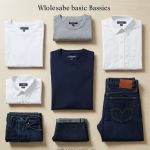
Wholesale Men’s Basics That Never Go Out of Style: Stocking Essentials for Consistent Sales
May 13, 2025
Choosing a Reliable Wholesale Men’s Clothing Supplier: The Daniel Rizotto Assurance
May 19, 2025Sustainable and Ethical Wholesale Men’s Fashion: Appealing to the Conscious Consumer
In today’s world, consumers are increasingly aware of the social and environmental impact of their purchasing decisions. This trend is particularly strong in the fashion industry, where the demand for sustainable and ethically produced clothing is rapidly growing. For wholesale buyers, understanding and catering to this conscious consumer is no longer optional; it’s a key to long-term success. This guide will explore the importance of sustainable and ethical men’s fashion, provide insights into key considerations for wholesale purchasing, and help you appeal to this growing market segment.
The Rise of the Conscious Consumer:
Consumers are actively seeking brands that align with their values. They want to know where their clothes come from, how they are made, and what impact their purchase has on the environment and the people involved in the production process. Statistics show a significant increase in demand for sustainable and ethical fashion, with many consumers willing to pay a premium for products that meet these standards. This shift in consumer behavior presents a unique opportunity for wholesale businesses to differentiate themselves and build a loyal customer base.
Key Considerations for Sustainable and Ethical Wholesale Men’s Fashion:
- Sustainable Materials:
- Organic Cotton: Grown without harmful pesticides and fertilizers, organic cotton is a more environmentally friendly alternative to conventional cotton.
- Recycled Fabrics: Using recycled materials, such as recycled polyester or recycled cotton, reduces waste and the need for virgin resources.
- Innovative Materials: Look for materials like Tencel (made from sustainably sourced wood pulp) or hemp, which have a lower environmental impact.
- Ethical Production:
- Fair Labor Practices: Ensure that the factories producing your clothing provide fair wages, safe working conditions, and respect workers’ rights. Look for certifications like Fair Trade.
- Transparency and Traceability: Choose suppliers who are transparent about their supply chain and can provide information about the origin and production of their garments.
- Certifications:
- GOTS (Global Organic Textile Standard): Ensures that textiles are made from organic fibers and produced in an environmentally and socially responsible way.
- Oeko-Tex Standard 100: Guarantees that textiles are free from harmful substances.
- Fair Trade Certified: Ensures fair wages and safe working conditions for farmers and workers.
- B Corp: Certifies companies that meet high standards of social and environmental performance.
- Reducing Environmental Impact:
- Water Conservation: Look for production processes that minimize water usage.
- Waste Reduction: Choose suppliers who prioritize waste reduction and recycling.
- Lower Carbon Footprint: Consider the transportation and manufacturing processes and choose suppliers who are working to reduce their carbon footprint.
- Communicating Your Commitment:
- Transparency: Be open and honest with your customers about your sourcing and production practices.
- Storytelling: Share the stories behind your products and the people who make them.
- Certifications: Highlight any certifications you have to build trust and credibility.
Appealing to the Conscious Consumer:
- Highlight sustainability and ethical practices in your marketing materials.
- Provide clear information about materials, production, and certifications.
- Offer a curated selection of sustainable and ethical men’s clothing.
- Partner with brands that share your values.
- Educate your customers about the importance of sustainable fashion.
Partnering with Daniel Rizotto for Sustainable and Ethical Wholesale:
At Daniel Rizotto, we are committed to providing our wholesale partners with high-quality, sustainable, and ethically produced men’s fashion. We offer a range of products made from organic and recycled materials, and we work with factories that adhere to fair labor practices. We are transparent about our supply chain and are happy to provide information about our certifications and environmental initiatives.
Conclusion:
The demand for sustainable and ethical men’s fashion is only going to continue to grow. By understanding the needs of the conscious consumer and offering products that align with their values, wholesale businesses can not only contribute to a more sustainable future but also build a thriving and loyal customer base.



